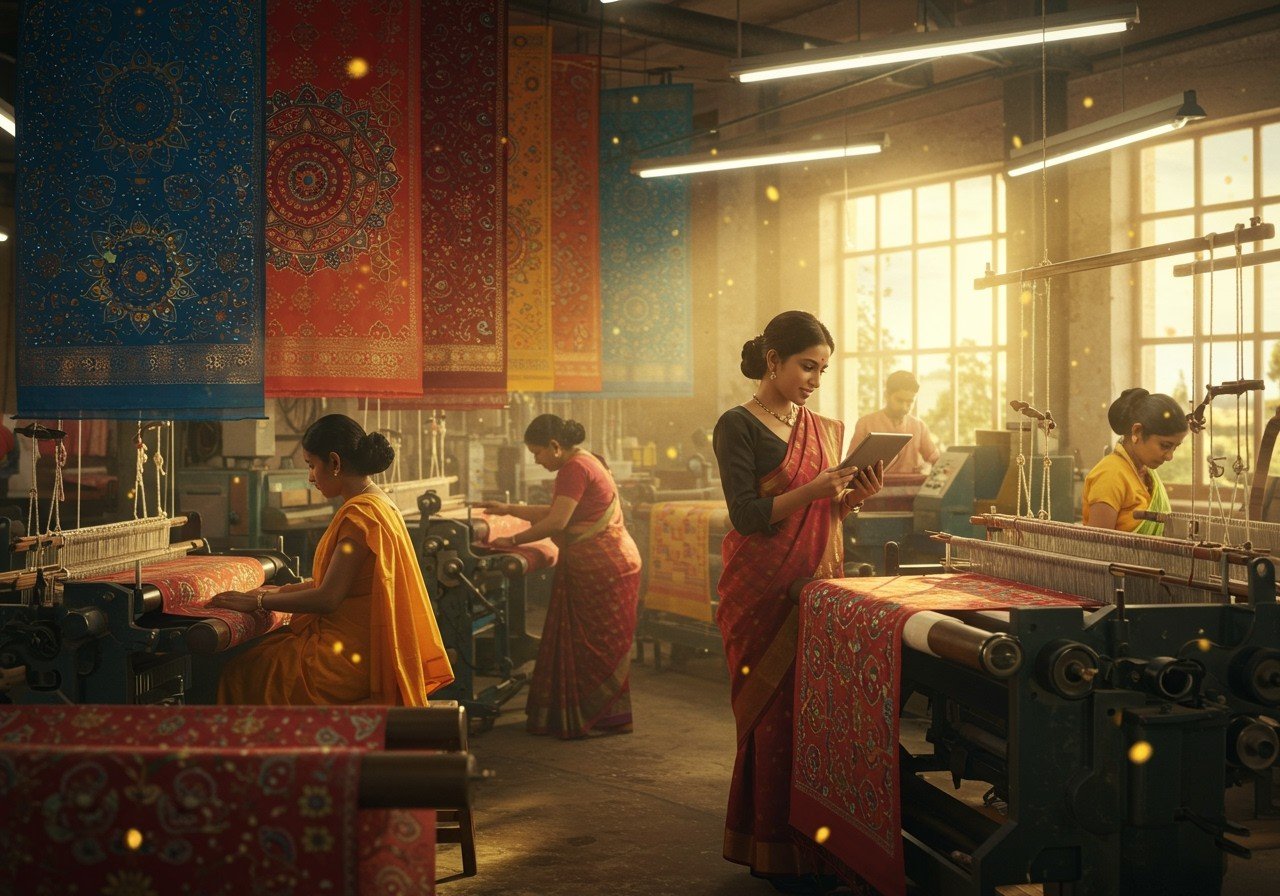
The textile industry in India is a vibrant cornerstone of the nation’s cultural heritage and economic landscape. Steeped in tradition, it plays a vital role in India’s global trade presence. From ancient crafts to modern manufacturing, this dynamic sector offers diverse career opportunities, contributing significantly to the Indian economy. Textiles hold immense cultural importance in India, and there’s a rising trend of purchasing both traditional and modern textile products online.
Overview of the Indian Textile Industry
The Indian textile sector encompasses a wide spectrum, from cotton and silk to wool, jute, and the intricate art of handloom weaving. It contributes significantly to India’s GDP and serves as a major source of employment. India’s textile exports reach numerous countries, solidifying its position in global trade. Government initiatives such as ‘Make in India’ aim to further bolster production and create new job opportunities. Simultaneously, technological advancements are modernizing traditional manufacturing, increasing efficiency and output.
Key Roles and Opportunities within the Textile Industry
India’s textile industry offers a rich blend of traditional craftsmanship and modern innovation. Whether your passion lies in design, management, or the art of sales, there is a place for you in this dynamic sector. Let’s explore some of the opportunities that await.
Diverse Career Paths
-
Textile Design: In this field, creativity and craftsmanship converge. Designers conceptualize and create stunning patterns and fabrics, often using computer-aided design (CAD) tools. This role requires artistic vision and technical expertise.
-
Production Management: Production managers orchestrate the entire manufacturing process, from the sourcing of raw materials to the creation of finished products. Their skills ensure smooth and efficient operations.
-
Quality Control: Maintaining high standards is paramount in the textile industry. Quality control experts meticulously inspect textiles to ensure only the finest products reach the market, preserving India’s reputation for quality.
-
Sales and Marketing: Skilled professionals in sales and marketing promote India’s exquisite textile creations to both domestic and international markets, expanding the industry’s reach.
-
Research and Development: This exciting field pushes the boundaries of textile innovation. Researchers explore new materials, techniques, and technologies, ensuring India remains at the forefront of the global textile industry.
Preserving India’s Textile Heritage
Traditional artisans and craftspeople play an invaluable role in preserving India’s rich textile heritage. They pass down generations of knowledge and skill, ensuring the continuation of these ancient art forms. Their dedication adds authenticity and cultural significance to India’s textile offerings.
Career Growth and Progression
The textile industry offers clear pathways for career advancement. Entry-level positions often lead to senior management roles. The global nature of the industry also presents opportunities for international exposure, expanding horizons and enriching careers. Developing essential skills like fabric knowledge, color theory, and proficiency in CAD can open doors to a wide range of roles and accelerate career growth.
Salary Expectations in the Indian Textile Industry
Salaries within India’s textile industry vary depending on the specific role, experience level, and location. The average salary is approximately ₹530,000 per year. Entry-level positions typically start around ₹352,500 annually, while seasoned professionals can earn up to ₹1,662,500.
Specific roles influence earnings. For instance, textile sales professionals average around ₹500,000 per year. Entry-level sales roles start at approximately ₹370,000, with potential earnings reaching ₹1,250,000 for experienced individuals. Geographic location also plays a factor. As of April 22, 2025, a textile worker in Mumbai earned approximately ₹455,377 per year.
Education and Skill Development for Textile Professionals
A strong educational foundation is crucial for success in the textile industry. Specialized degrees in textile engineering, fashion design, or textile management are highly valued. Several prestigious institutions in India offer comprehensive courses in these fields. Practical experience gained through internships and on-the-job training complements academic learning and enhances career prospects. In addition to technical expertise, soft skills like communication, teamwork, and problem-solving are essential for career advancement.
Challenges and Opportunities in the Textile Landscape
The textile industry faces challenges such as international competition and fluctuating raw material prices. Growing environmental concerns also necessitate sustainable practices. However, the industry is adapting through innovation and eco-conscious approaches. Digital transformation is revolutionizing processes, creating exciting opportunities in niche markets like eco-friendly textiles. The rise of e-commerce is fueling global demand for Indian textiles, promising further growth and job creation.
Future Prospects of the Indian Textile Industry
The Indian textile industry has a bright future. Projections suggest the industry will reach $350 billion by 2030, potentially generating 35 to 60 million jobs. Government policies, global trends, and a growing emphasis on sustainability will shape the industry’s trajectory. Automation and AI are transforming production, creating new opportunities. India’s ambition to become a global leader in textile innovation holds exciting prospects for aspiring and established professionals.
How Poojn.in Supports Textile Industry Professionals
Poojn.in, India’s largest cultural goods and services store, offers a wide array of essential items for workplace ceremonies and traditions in the textile industry. We provide everything you need, from inauguration ceremonies to daily rituals.
-
Factory Openings: We offer complete Vastu puja kits for new textile unit inaugurations, specialized items for machine puja ceremonies, and bulk quantities of coconuts, flowers, and other offerings. Start your new venture with auspicious blessings. Explore our Paddy for Puja.
-
Workplace Worship: Maintain a sacred space with our daily puja items for factory temples and shrines. We offer brass and copper vessels for rituals, as well as quality incense and dhoop for regular worship. Find premium Camphor Powder here.
-
Festival Celebrations: Celebrate festivals with our Vishwakarma puja items for annual machine worship and Diwali puja materials for business prosperity. We also offer bulk corporate gifting options for festivals. Shop for colorful Cotton Threads.
-
Traditional Tool Worship: Honor tradition with special items for charkha puja, materials for loom blessing ceremonies, and ritual items for tool worship during Ayudha Puja. Discover Black Sesame Seeds for rituals.
Our Products for the Textile Industry:
- Factory Vastu Puja Kit
- Industrial Unit Blessing Set
- Machine Puja Thali Set
- Workplace Temple Essentials Kit
- Bulk Festival Supplies Pack
Visit Poojn.in or contact our customer service for bulk orders and corporate purchases. We deliver across India with secure packaging and timely service.
[Note: Product availability and prices may vary. Please check the website for current options.]
Embracing the Future of Textiles
The Indian textile industry stands at the cusp of growth and innovation. With its rich heritage and promising future, it beckons those who seek a dynamic and rewarding career. Whether you’re drawn to preserving traditional crafts or intrigued by cutting-edge technologies, the industry embraces both. As India strives to become a global textile leader, your skills and passion can help shape this journey. Embrace the challenges, seize the opportunities, and watch your career flourish within the vibrant tapestry of India’s textile industry.
FAQs on Textile Industry Jobs in India: Salaries & Career Paths
What kind of jobs are available in the Indian textile industry? The Indian textile industry offers a wide range of career paths, from design and production to quality control, sales, marketing, research, and development. You can find roles such as textile designers, machine operators, quality analysts, sales executives, marketing managers, and research scientists.
What’s the typical salary range for a textile designer in India? Textile designers in India can earn between ₹300,000 and ₹600,000 per year, depending on their experience, skills, and the company they work for. Senior designers with extensive experience can earn even more.
What educational qualifications are required for textile industry jobs? Most jobs in the textile industry require at least a diploma or degree in a related field, such as textile design, textile engineering, or fashion design. Some roles may also require specialized training in specific areas like fabric technology.
Are there opportunities for career growth in the textile industry? Yes, the textile industry offers significant growth potential. With experience and further skill development, you can advance to senior positions like senior designer, production manager, or even head of a department.
Which skills are essential for success in textile industry jobs? Key skills for success include creativity, attention to detail, a strong understanding of fabrics and textile technology, proficiency in design software (like CAD), and excellent communication and teamwork skills.
Are there job openings for recent graduates in the textile sector? Absolutely! The Indian textile industry welcomes fresh graduates with open arms. Many entry-level positions, such as junior designer or trainee, provide valuable experience and opportunities for career growth.
What is the average salary for a textile engineer in India? Textile engineers in India can expect to earn between ₹400,000 and ₹800,000 per year. Factors like experience, location, and the company you work for can influence your salary.
Why choose a career in the textile industry? A career in textiles can be incredibly rewarding, offering a dynamic environment, scope for creativity, diverse roles, opportunities for growth, and a chance to work with innovative technologies. It’s a sector steeped in tradition yet constantly evolving, making it an exciting field to be a part of.


